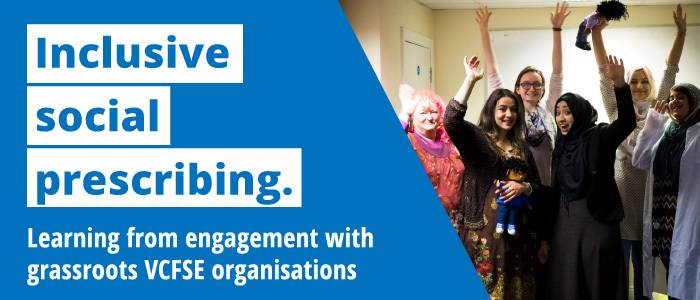Inclusive social prescribing: Learning from engagement with grassroots VCFSE organisations

This blog was first published in June 2023, to celebrate the launch of our Inclusive Social Prescribing report.
We are delighted to launch a new VCSE Health and Wellbeing Alliance report exploring inclusive social prescribing. The report summarises our engagement last year with over 25 faith and community organisations either interested in or actively involved with social prescribing schemes.
The report highlights best practice, outlines key barriers to inclusivity, and makes a series of recommendations to policymakers, providers and faith groups.
Click here to read the report.
More about the work
Social prescribing has been on our radar for a while now. Four years ago we outlined what it is, as well as why/how faith-based organisations might want to become involved. We discovered though research on tackling loneliness in 2019 that many of our members were simply not connected with social prescribing schemes, or even aware what it was. Back then, we recommended that all social prescribing schemes should seek to integrate faith-based and community organisations within their offer.
We think social prescribing is a great idea, but that there is still much more to do to ensure it can be utilised by the communities who will benefit most, and we think inclusion of faith communities can help with this.
Last year, as part of our role within the VCSE Health and Wellbeing Alliance, we set out to go into a bit more depth, exploring best practice in the inclusion of faith- and community-based centres in the roll out of social prescribing and tackling loneliness.
We held two roundtables in the summer of 2022, gathering 25 voluntary, community faith and social enterprise (VCFSE) colleagues, representing a range of communities experiencing inequalities, as well as representatives of social prescribing schemes and structures.
We followed this up with 7 one-to-one conversations with VCFSE organisations. This report summaries the findings from the roundtables and interviews, presenting best practice and recommendations for both commissioners and faith groups to support the reduction of inequalities in access to social prescribing.
'Social Prescribing’ ... My community will not recognise that. We have so much faith in the medical field, that they know best ... So it’s about actually re-educating ... That you can look after your wellbeing as well.”
Leader of Muslim-led VCSE organisation
What did we find?
Our findings suggested that awareness of and access to social prescribing among communities experiencing inequalities is not as widespread as it could or should be.
We asked participants how far they agreed with the statement, “People in my community are aware of social prescribing”. Over half disagreed with the statement.
Regarding the statement “People in my community know how to access social prescribing”, two thirds disagreed.
There were a range of reasons why participants felt access and awareness might be challenging, including language difficulties (both in terms of lack of translation, but also use of jargon and clinical-sounding vocabulary), geographical inequalities and lack of trust in health services among communities.
But we also uncovered key hallmarks of inclusive practice, such as involvement of communities from the start, development of faith and culturally-relevant services, and sustainable funding.
We used our findings to develop a set of recommendations to aid practice in the rollout of social prescribing. These include:
…for social prescribing commissioners and host organisations
- Ensure local social prescribing schemes are relatable and approachable for communities experiencing inequalities
- Reframe language surrounding social prescribing at a hyper-local level so that it is accessible for communities
- Create visible communication pathways for VCFSE organisations
- Make sure any local mapping of services goes beyond the ‘usual suspects’
…for wider health systems
- Encourage representation of the faith and community sector in place-based forums
- Ensure that sustainable resource flows to the neighbourhoods that need it most
- Ensure all primary care professionals are supported to make appropriate use of social prescribing
- Adopt ‘community champions’ models to raise awareness of social prescribing within communities
Have a read of our full report, and let us know what you think!
Do you have experience of social prescribing, either as a beneficiary, referrer or provider? If so, what has been your experience, are there additional barriers or markers of best practice that we ought to be aware of?
What is social prescribing?
If you’re not aware, social prescribing is a way for people to be referred to non-clinical forms of support, usually through a social prescriber or “link worker”, trained to listen and signpost. Typically, people think of this happening through a visit to the GP, and it often does, but in reality social prescribing referrals can come from a range of places, and you can even self-refer into social prescribing. Social prescribing schemes have been rapidly rolled out across England, in part due to funding for link workers provide through the NHS Long Term Plan in 2019.

About Jeremy Simmons
Policy and Programme Manager
Jeremy works to raise the profile and voice of the faith-based sector in policy making and gather evidence of local faith-based solutions. He leads FaithAction’s programme of work with the Department of Health and Social Care, the UK Health Security Agency (UKHSA) and NHS England, and is part of the team supporting FaithAction’s secretariat role for the All Party Parliamentary Group (APPG) for Faith and Society, and Faith Covenant. He is passionate about helping the faith-based sector work in partnership with other agencies.


